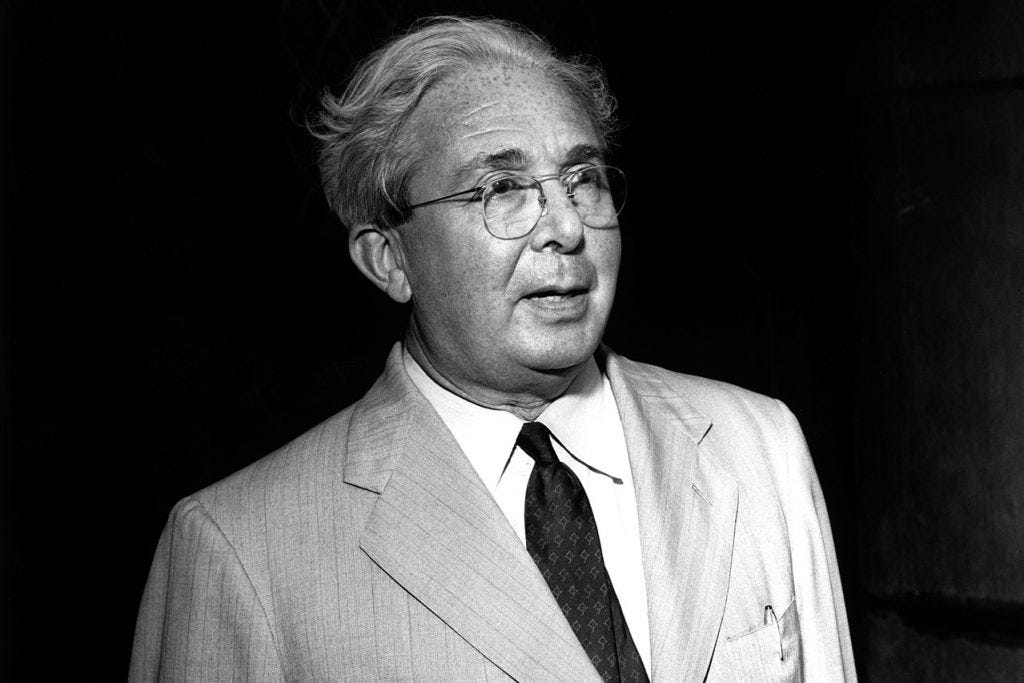When Leo Szilard, on July 4, Tried to Halt Dropping the Bomb
His petition drew wide support from his fellow atomic scientists, on "moral" grounds--to no avail.
Greg Mitchell is the author of a dozen books, including “Hiroshima in America,” “Atomic Cover-up,” and “The Beginning or the End: How Hollywood—and America—Learned to Stop Worrying and Love the Bomb.” He has directed three documentary films since 2021, including three for PBS (one of them the award-winning “Atomic Cover-up”). You can still subscribe to this newsletter for free.
On July 4, 1945, the great atomic scientist Leo Szilard finished a letter that would become the strongest (and one of the very few) real attempts at halting President Truman's march to using the atomic bomb--which was two weeks from its first test at Trinity--against Japanese cities.
It’s well known that as the Truman White House made plans to use the first atomic bombs against Japan in the summer of 1945, a large group of atomic scientists, many of whom had worked on the bomb project, raised their voices, or at least their names, in protest. They were led by the Szilard. On July 3, he finished a petition to the president for his fellow scientists to consider, which called atomic bombs “a means for the ruthless annihilation of cities.” It asked the president “to rule that the United States shall not, in the present phase of the war, resort to the use of atomic bombs.”
The following day, July 4, he wrote this cover letter (below). The same day, Leslie Groves, military chief of the Manhattan Project, wrote Winston Churchill’s science advisor seeking advice on how to combat Szilard and his colleagues. The FBI was already following Szilard. The bomb would be dropped over Hiroshima on August 6.
July 4, 1945
Dear _______________
Enclosed is the text of a petition which will be submitted to the President of the United States. As you will see, this petition is based on purely moral considerations.
It may very well be that the decision of the President whether or not to use atomic bombs in the war against Japan will largely be based on considerations of expediency. On the basis of expediency, many arguments could be put forward both for and against our use of atomic bombs against Japan.
Such arguments could be considered only within the framework of a thorough analysis of the situation which will face the United States after this war and it was felt that no useful purpose would be served by considering arguments of expediency in a short petition.
However small the chance might be that our petition may influence the course of events, I personally feel that it would be a matter of importance if a large number of scientists who have worked in this field went clearly and unmistakably on record as to their opposition on moral grounds to the use of these bombs in the present phase of the war.
Many of us are inclined to say that individual Germans share the guilt for the acts which Germany committed during this war because they did not raise their voices in protest against these acts. Their defense that their protest would have been of no avail hardly seems acceptable even though these Germans could not have protests without running risks to life and liberty. We are in a position to raise our voices without incurring any such risks even though we might incur the displeasure of some of those who are at present in charge of controlling the work on “atomic power”.
The fact that the people of the people of the United States are unaware of the choice which faces us increases our responsibility in this matter since those who have worked on “atomic power” represent a sample of the population and they alone are in a position to form an opinion and declare their stand.
Anyone who might wish to go on record by signing the petition ought to have an opportunity to do so and, therefore, it would be appreciated if you could give every member of your group an opportunity for signing.
Leo Szilard
What happened next? Well, here's a pithy summary from the author of bio of Leo Szilard. As you'll see, the petition gained from than 180 signatures—Oppenheimer obviously not one, and actively discouraged others—but was then delayed in getting to President Truman by Gen. Leslie Groves, military head of the Manhattan Project, until the A-bombs were ready to use. Groves also commissioned a poll of atomic scientists, which found that over 80% favored a demonstration shot only--so he squelched that, too. Much more in my 2020 book: The Beginning or the End: How Hollywood--and America--Learned to Stop Worrying and Love the Bomb.





Szilard had no problem supporting the effort when the target was the Germans, who expressly were targeting Jews; once Germany was defeated, he apparently was thinking of anyone else. Including Japanese lives saved by the quickest possible termination of the war, avoidance of Russian occupation of part of Japan, etc etc. He also conveniently ignored the massive, atomic-scale causalities then occurring of more ‘conventional’ bombing of Japanese cities. The Japanese were not going to surrender; even famed director Akira Kurosawa, in his autobiography, talked about how he & his wife were like all other Japanese in automatically- & unquestionably- accepting of the “Death of the 100 million” as it was called nationally; essentially, acceptance of a national ritual seppuku per se. Even the atomic bomb didn’t bring the cabinet to decide on surrender; but it DID shock the Emperor into his unprecedented decision to do so. & even that was almost un-done at the last minute by the Japanese military. - Dave Huntsman
Thank you. Question does your 2020 book cover the details of the so-called demonstration shot? Whar were the demonstration options? Thanks again.